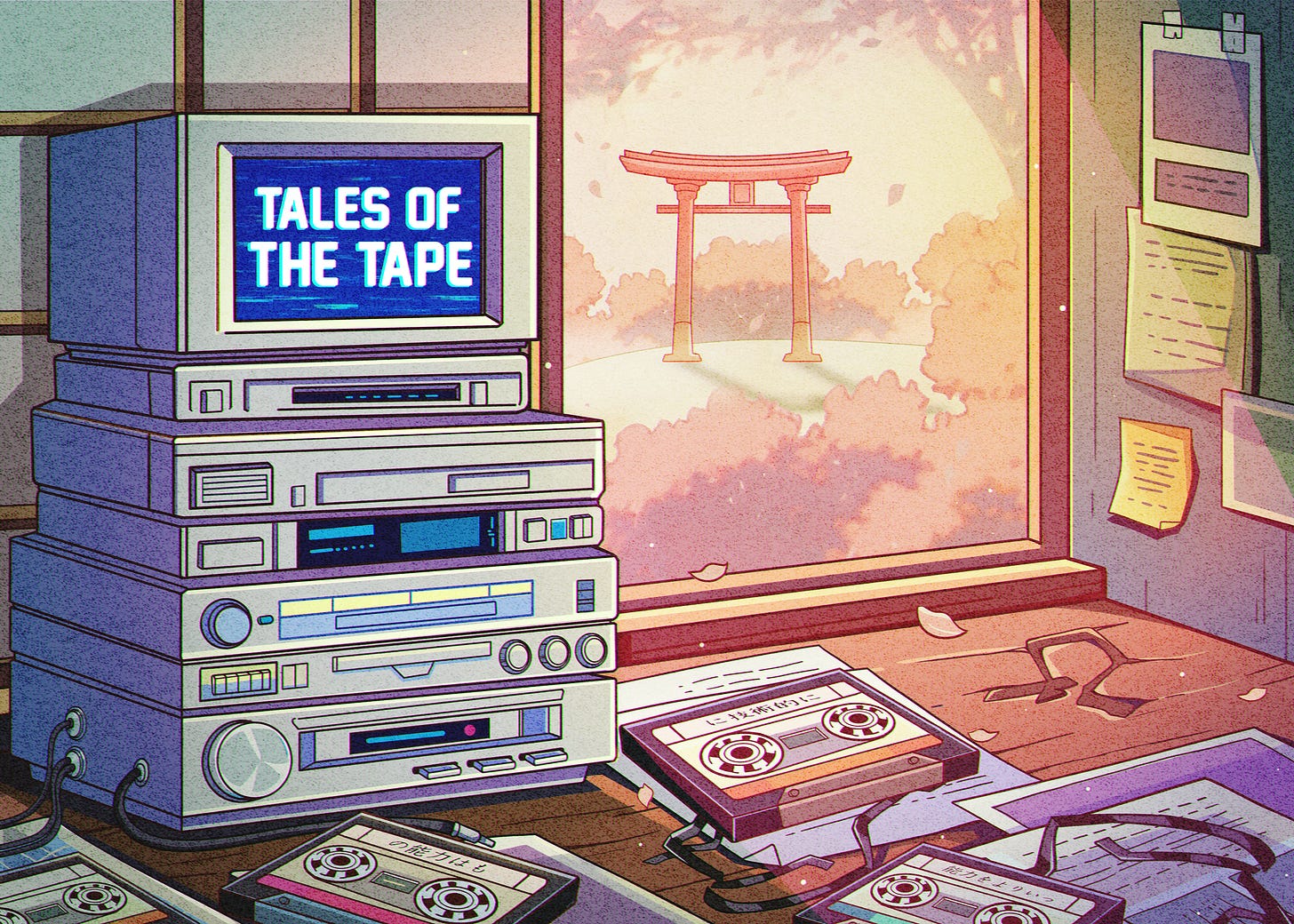Tales of the Tape #8: The French Perfectionist - How One Creator Rejected the Algorithm and Won Anyway
It’s been a long time… Welcome back to Tales of the Tape.
This week, I analysed a candid conversation with one of France's most respected storytelling creators, a 30-year-old who has built a large YouTube following by doing everything the experts say you shouldn't do: Augustin, aka “TheGreatReview”.
The good thing is that the guy interviewing him is himself someone rather unique in the digital/gaming French landscape: Arthur Perticoz. Peep this:
Serial entrepreneur with multiple exits (Omnis Event, Wynd, and Ayelight, before founding Majelan, a… premium podcast platform, and now he hosts one regularly, see below)
Transformed Karmine Corp into a major esports organisation.
Recently stepped down as CEO - Transitioned from operational CEO role in January 2025 to a strategic advisor and board member position, emphasising this was planned growth restructuring rather than a loss of confidence in the project.
Active content creator and sustainability advocate.
Regarding TheGreatReview, I even showed his absolute GOAT-status video about ROX Tigers to my mother (who still doesn’t know what I do for a living, just that “I work with videogames and the bitcoin”).
Like many, I love his narration, and what makes this conversation particularly compelling is how it challenges every piece of advice you'll get from YouTube "growth hackers." While everyone else is optimising for retention curves and posting schedules, this guy is spending half a year crafting single videos and somehow building one of the most engaged audiences on the platform.
Ready? Let’s dive in to it !
The Minimum Wage Trap
The origin story isn't about initial capital or startup funding. It's about recognizing when safety becomes a prison.
Working at Webedia (France's equivalent of a major gaming media conglomerate), our creator was making minimum wage in Paris. Steady work in an notoriously unstable industry, but barely enough to survive in one of Europe's most expensive cities.
The turning point wasn't a business opportunity or investor meeting. It was the slow realization that corporate "security" was actually quicksand - comfortable enough to keep you from drowning, but impossible to build anything meaningful on.
"If my channel flops, very quickly I won't be able to pay my rent," he admits with startling honesty. "We're not paid fortunes at Webedia. But I got by. I had minimum wage. Minimum wage in Paris is really difficult."
The choice was stark: continue the slow grind of corporate mediocrity or risk everything on the belief that he could create something better. No safety net, no gradual transition, no testing the waters while keeping the day job.
Most people would have chosen the stable path. He chose creative independence over financial security and never looked back.
The Anti-Algorithm Philosophy
While every YouTube guru preaches the gospel of consistent uploads and algorithmic optimization, our creator built his audience by doing the exact opposite.
His approach is almost perverse in its inefficiency: spend 6-8 months researching and crafting each video, release maybe two per year, and maintain zero awareness of what competitors are doing.
"I deliberately avoid watching other storytelling creators," he explains. "The less I watch, the less risk there is of being influenced by what they do. This way, I keep my style, and it's better for everyone."
Think about how backwards this sounds. In an industry obsessed with trend-chasing and rapid iteration, he's deliberately isolating himself from outside influence to preserve creative authenticity.
The results speak for themselves. His videos consistently hit over a million views, generate massive engagement, and create the kind of passionate fanbase that most creators would kill for. He's proven that quality over quantity isn't just possible on YouTube - it's potentially more powerful than gaming the algorithm.
The Perfectionist's Curse
But there's a dark side to this approach that he's refreshingly honest about. The pursuit of excellence becomes its own prison.
"Most of my big videos, I obsessed over them, I redid each part 150 times, and I released them when I finally lost my mind because I couldn't work on them anymore."
This isn't sustainable, and he knows it. The creative process becomes a form of psychological torture where videos are never truly "finished" - just abandoned when the creator reaches his breaking point.
The next video he's releasing represents a conscious experiment in lowering his own standards. Not because he wants to make worse content, but because he realizes that chasing perfection is ultimately counterproductive.
"It's not a very healthy way to work. It makes you crazy in the long run. If I want to still be making videos in a few years, I need to be less obsessed with pursuing excellence that isn't even profitable."
There's wisdom here that applies far beyond YouTube. The pursuit of perfection often becomes the enemy of productivity, creativity, and mental health.
The AI Reality Check
One of the most telling moments comes when he describes experimenting with AI for research. Whileworking on a video about French Resistance activities, he decided to test whether AI could speed up his historically meticulous research process.
The results were initially impressive. The AI provided detailed information about specific resistance operations, complete with dates, locations, and participants. Everything looked professionally researched and properly cited.
Then he fact-checked one of the events. It never happened. None of the ten examples the AI provided were real. The AI had fabricated an entire alternative history of World War II resistance activities.
"It was terrifying to discover. If I had put that in my video, I would have invented 10 historical facts that never occurred. And the AI tells you this with such confidence."
This experience crystallized something important about the current state of AI tools. They're incredibly convincing at generating plausible-sounding information, but they can't distinguish between fact and fiction. For creators who prioritize accuracy above speed, AI becomes more liability than asset.
The Recognition Paradox
There's something deeply human about how he describes dealing with fame. Getting recognized inpublic was initially exciting, then became routine, and finally evolved into a mild inconvenience that comes with the territory.
(Note: I met him at the entrance of the CSGO Major in Paris, where Vitality won a few years back)
"The first time someone stopped me in the metro, it made me a bit anxious. I found it funny, but it also made me realize that I'd lost anonymity forever. No matter where I go, there's someone who might recognize me."
His solution was elegantly simple: move to a smaller town in southern France where the density of his audience is lower. Not hiding from fame, just reducing its daily friction.
But here's what's interesting - he's not complaining. There's an acceptance that recognition is part of the job, and that the people who recognize him are consistently respectful and kind. It's a mature perspective on a problem that destroys some creators.
(Note: don’t be d****s to people you meet, don’t be a stalker - we’ve seen what happened to Valkyrae and other famous creators)
The Platform Strategy
His approach to different social media platforms reveals someone who understands his strengths and doesn't try to be everything to everyone.
YouTube is his primary focus because it rewards long-form, high-effort content. Twitch works when he has games that benefit from shared experience - puzzle games where viewers enjoy watching someone work through challenges in real-time. TikTok occasionally works, but only when he creates content specifically designed for the platform rather than repurposing existing material.
Instagram remains a mystery to him. "Instagram is a lifestyle platform. The content that works well on Instagram is 'I went to the beach, look, I had ice cream.' Since I'm a dirty geek who doesn't leave his room..."
There's no shame in this admission. He's not trying to crack every platform or maximize his reach acrossall possible channels. He's focused on doing one thing exceptionally well rather than doing many things adequately.
Lessons for Modern Creators
Three principles emerge from this conversation that challenge conventional creator wisdom:
Isolation can be a competitive advantage.
While everyone else is studying what works and copyingsuccessful formats, deliberately avoiding outside influence can help you develop something genuinelyunique. The risk of missing trends is offset by the benefit of creating something no one else could make.
Quality compounds differently than quantity.
Publishing less frequently but at higher quality cancreate deeper audience engagement and longer content lifespan. His videos continue gaining viewsmonths after publication because they're designed to be rewatched rather than consumed once andforgotten.
Authenticity requires saying no to optimization.
Every piece of creator advice focuses on growthhacking and algorithmic optimization. But sustainable creative careers often require deliberately choosinginefficient methods that preserve what makes your work special.
The Future of Slow Content
What strikes me most about this creator's approach is how it represents a counter-revolution to the dominant trends in digital media. While everyone else is speeding up, posting more frequently, and chasing algorithmic trends, he's deliberately slowing down and focusing on craft. (Note: a lot of other French YTbers followed his path and are doing well)
This isn't just rebellion for its own sake. It's a strategic bet that audiences are hungry for content that respects their intelligence and attention spans. In a world of endless scroll and instant gratification, there'smassive value in creating something worth waiting for.
His success suggests that the future of content creation might not be about who can publish fastest or most frequently, but who can create something so compelling that audiences will wait months between releases.
Hope you found this perspective as refreshing as I did.
Until next time,
Rachid




